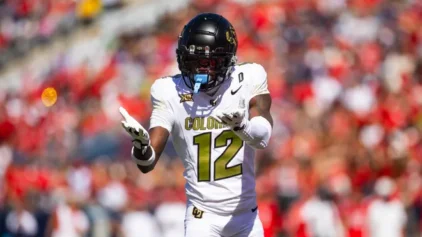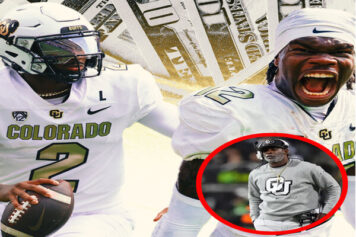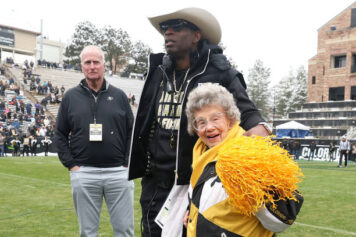As we celebrate Atlanta in all of its splendor, it’s time reflect on Deion Sanders and what he meant to the city, the NFL and the culture at large.
“Atlanta was it for me, man. Atlanta was the crib. Atlanta was home. I loved Atlanta. Atlanta was Prime. Prime was Atlanta.” – Deion Sanders
In 1989, Deion Sanders arrived as a rookie with the Atlanta Falcons. Few knew that the cornerback out of Florida State would singlehandedly transform the franchise and the city with his Prime Time persona and otherworldly athletic gifts.
Atlanta is on center stage right now as a thriving metropolis and the host of Super Bowl LIII, but prior to Sanders’ arrival, the NFL had little to brag about regarding the city and the Falcons.
The flamboyance of his alter ego and dominance as a shutdown corner transcended anything Atlanta has ever experienced on the football field before.
The city is now hosting its third Super Bowl and widely recognized as one of the epicenters of Black music, entertainment and culture. And that rise coincided with the burgeoning, blossoming, high-stepping legend of Prime Time.
It’s impossible to ignore what he meant to Atlanta’s ascension, along with how the cornerback position was viewed and defined. He turned it into a glamour position and elevated the pay scale accordingly.
When MC Hammer was at the apex of his formidable popularity, he could be found on the Falcons sideline, along with other Hip Hop and entertainment royalty. They weren’t drawn there because Deion was simply good, they were there to experience a phenomenon of flamboyant greatness.
“Deion was a part of the spirit of Atlanta,” Jerry Glanville, who coached the Falcons from 1990 to 1993, told the Washington Post. “People don’t know this, but they’d have to close the airport when we’d come home after away games because there were so many people wanting to greet us, wanting to greet Deion. Not after we won a playoff game; it was every time. He loved every minute of it.”
Sanders’ climb out of poverty in Fort Myers, Florida was no easy one. In the Letter To My Younger Self that he recently penned for The Players’ Tribune, he talks about watching his mother “slaving over those pots and pans, trying to put dinner on the table after working all day as a custodian at the hospital. You saw the strain on Mama’s face. The fatigue in her eyes.”
“You’re gonna come a long way from the house at 1625 Henderson Avenue in Fort Myers, Florida” he wrote. “Far from the Jones Walker apartments, where you spent the first years of your youth playing kill the carrier using an empty milk jug as a football because nobody had a real one. Where you used balled-up tinfoil for a baseball and slapped it around with your hands because nobody could afford a bat. Where you played basketball on a hoop made from a bicycle tire rim nailed to a piece of wood.”
“And it’s not just the models of righteousness like Mama who you can learn from,” he continued. “There will be plenty of negative examples, too. Just look at the father figures in your life. Papa’s a rolling stone. He’s there, but he’s not there. And he’s plagued by bouts with drug addiction. And your stepdad? He’s a good man — a hard-working man. But he struggles with alcoholism. That’s why you will never — ever — drink or do drugs a day in your life. You’ll see firsthand what that gets you, and you won’t like where those roads lead.”
As a high school senior, Sanders weighed only 150 pounds, but his status as an elite baller was already solidified.
He wrote:
You’re small for your age. That will continue. You’ll be 138 pounds as a junior in high school. By your senior year, you’ll only be 150. So you won’t get recognized for ballin’ on the football field until about midway through your senior year. That’s when college coaches will finally realize, Yo, this cat is small, but he can play! And they’ll start coming down to North Fort Myers High School to see if they can secure your services.
It won’t be but a few schools. Florida will be in the mix, but they’ll mess around and treat you like just another recruit, so you won’t take them seriously. Wisconsin will be interested, but you’re from Fort Myers, son. You don’t even own a jacket. So you’ll X them off, too.
Georgia will fly you up to Athens for a visit, and you’ll have a front-row seat to watch them get their butts kicked by Georgia Tech. After the game, you’ll be in head coach Vince Dooley’s office.
He’ll say, “Son, I hear you’re pretty good. Well, once you get redshirted and learn our system—”
You’ll cut him off right there.
“Redshirted? Learn your system? Coach, after what I just saw, I could start for you right now!”
X ’em off.
Next, you’ll visit Florida State, and that’s when their defensive coordinator, Mickey Andrews, will say something beautiful.
“If you come here, and you earn it, you will play. If you don’t earn it, you won’t.”
That’s all you’ll need to hear — music to your young ears. You got Mama’s work ethic, son. So you won’t have any problem working hard and earning your stripes. Far as you’ll be concerned, Florida State will be a lock.
But a baseball future was also in the mix, with the Kansas City Royals selecting him in the sixth round of the 1985 MLB Draft and offering a $40,000 signing bonus.
Some poor kids would have jumped at the money, but Sanders was thinking long-term and accepted the college scholarship instead. At Florida State, he became a force of nature while lettering in football, baseball and track. But it’s on the gridiron where his Prime Time persona captivated the imagination of the public.
https://www.youtube.com/watch?v=1b6hQAagrKA
“You’ll start your freshman year,” he wrote. “And during your sophomore year, you’ll take Prime Time to a whole new level — because you’ll have to. You’ll be looking ahead to the NFL, and you’ll see that there isn’t a single million-dollar defensive back in the league. In fact, cornerback is one of the worst-paid positions. That’s not gonna work for you, partner. You promised Mama that you would make enough money so that she would never have to work another day. You need to maximize everything.”
Sanders was a two-time consensus All-American at corner in 1987 and 1988, and took home the Jim Thorpe Award as the nation’s top defensive back in ’88, when he also led the country in yards per punt return.
The Falcons selected him with the fifth overall pick in the 1989 NFL Draft. And little did anyone know that he’d become a one-man showstopper, an amazing accomplishment for player on defense, let alone the secondary.
In 1991, the Falcons finished with a 10-6 record and took home only the second postseason victory in team history with a playoff win over the Saints. During his five years in Atlanta, Sanders made the all-pro team in three times.
Incredibly, he also played baseball for the Atlanta Braves from 1991 to 1994, hitting an astounding .533 in the 1992 World Series.
“This persona that he created fit Atlanta so perfectly because it was larger than life,” said Ken Rodgers, who directed Deion’s Double-Play, the ESPN 30-for-30. “He was just the perfect spokesman for the city because Prime Time had no problem shouting from any rooftop.”
“Think of it this way: It was the turning of the dawn in Atlanta,” Jamie Dukes, Sanders’ former Falcons teammate told the Washington Post. “Dominique and Deion put the city on the sports map. Simultaneously, you had Jermaine Dupri, Outkast, Arrested Development, Kris Kross, Toni Braxton and all those musical artists from Atlanta bursting on the scene. And the next wave was right behind them. And the Braves were a championship contender for a long time, and the Olympics came in 1996 and changed the city’s profile. It was just a perfect storm. But it all started with that swagger. Deion had that swag before any of us were calling it swag. He emboldened Atlanta.”
“The personality of Atlanta back when I played the game was really the fabric that bound the city together,” Sanders said in 2017 interview. “We were outward. We were somewhat flamboyant. We had a little flash, but we had a confidence that was like our natural odor. That’s just who we were. That’s what the city was. That’s what the city represented. And you could see that from all the entertainers from the music industry and all the actors that derived from Atlanta, they all had that commonality that we shared.”
Since his five-year run in a Falcons uniform, when the culture of winning began seeping into the franchise, only one player has come close to bringing that Prime Time swag to the franchise: Michael Vick.
But Vick, along with every other Falcons superstar to follow, owes Sanders a supreme debt of gratitude, because he was at the forefront, the face of a franchise that coincided with and contributed to Atlanta growing into the cultural and entertainment force it has now become.
As we celebrate the city in all of its splendor as it basks in the Super Bowl glow, with the sparkling Mercedes Benz Dome hosting America’s biggest sporting event, we should all take a pause for the cause to reflect on Deion Sanders and what he meant to Atlanta, the NFL and the culture at large.



